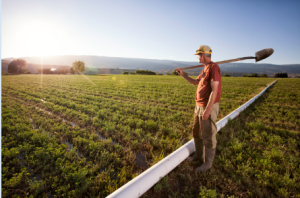 Agriculture accounts for more than 80 percent of all water consumed in the U.S.
Agriculture accounts for more than 80 percent of all water consumed in the U.S.
Some people might read that figure and think, “farmers are using all of our water!” But I see it differently. I see potential.
That’s because farmers and ranchers are the original environmentalists, water conservationists and land stewards. They have been, and continue to be, among the first to develop innovative water efficiency solutions, and they are already implementing a variety of practices to optimize their water use and adapt to drought and climate change.
On World Water Day, it’s important to remember that farmers are our best hope for solving the global water crisis.
Drought is a powerful motivator
Farmers are usually the first to feel the impact of drought, often experiencing water shortages before any urban water users are affected. For this reason, they are among the first to adapt, adjusting practices to increase efficiency.

Brendon Rockey is a third generation potato farmer at Rockey Farm in Colorado’s San Luis Valley. He is also a member of the National Young Farmers Coalition (Photo credit).
Take Jason Walker – a grain farmer in Arizona who, spurred by drought, laser-leveled 175 acres of his farm, a practice noted to be up to 30 percent more water efficient. He also lined the ditches that deliver water to his crops, since lined ditches retain up to 90 percent of their water, as compared to unlined ditches, which lose up to half their water.
“It’s absolutely our responsibility to conserve our finite resources,” Jason says.
When drought hit Brendon Rockey’s Colorado farm hard seven years ago, he planted cover crops to retain moisture in the soil, which also enhanced the effectiveness of his center pivot irrigation. Since then, Rockey’s pumping costs have decreased – his cumulative annual consumptive use cut nearly in half – while his crop quality increased. His neighbors now come to him for advice on maintaining a productive business through drought.
Farmers make a good investment
When you consider the sheer volume of water used in growing crops, adoption of water efficiency practices like these have big potential when taken to scale. Not only can farmers become more resilient to climate change; they also have greater flexibility to share water with other sectors, which generates revenue for farmers and provides additional benefits to other water users, not to mention rivers.
That’s why I’m hopeful that – through continued investments in agricultural efficiency and flexible infrastructure – farmers will lead us through the global water crisis.
But investments of this kind aren’t just about securing a reliable water supply; they are also about securing a reliable food supply. After all, farmers use water to produce the food that feeds the planet.
I’d consider that a good investment.










One Comment
Great blog and spot on!